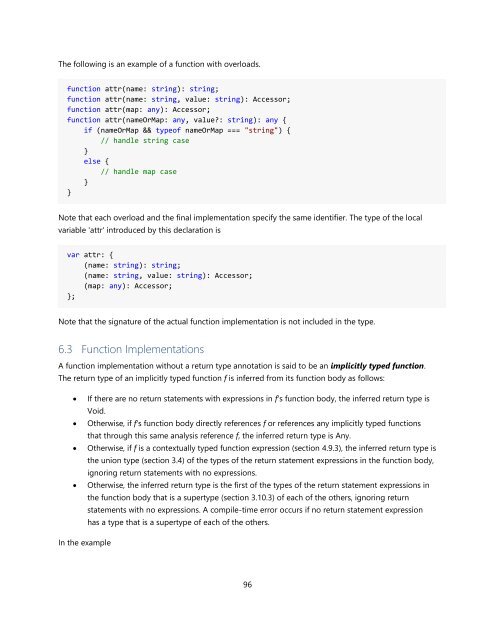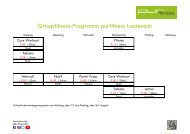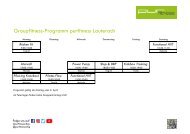TypeScript Language Specification v1.5
TypeScript Language Specification v1.5
TypeScript Language Specification v1.5
You also want an ePaper? Increase the reach of your titles
YUMPU automatically turns print PDFs into web optimized ePapers that Google loves.
The following is an example of a function with overloads.<br />
function attr(name: string): string;<br />
function attr(name: string, value: string): Accessor;<br />
function attr(map: any): Accessor;<br />
function attr(nameOrMap: any, value?: string): any {<br />
if (nameOrMap && typeof nameOrMap === "string") {<br />
// handle string case<br />
}<br />
else {<br />
// handle map case<br />
}<br />
}<br />
Note that each overload and the final implementation specify the same identifier. The type of the local<br />
variable 'attr' introduced by this declaration is<br />
var attr: {<br />
(name: string): string;<br />
(name: string, value: string): Accessor;<br />
(map: any): Accessor;<br />
};<br />
Note that the signature of the actual function implementation is not included in the type.<br />
6.3 Function Implementations<br />
A function implementation without a return type annotation is said to be an implicitly typed function.<br />
The return type of an implicitly typed function f is inferred from its function body as follows:<br />
<br />
<br />
<br />
<br />
If there are no return statements with expressions in f's function body, the inferred return type is<br />
Void.<br />
Otherwise, if f's function body directly references f or references any implicitly typed functions<br />
that through this same analysis reference f, the inferred return type is Any.<br />
Otherwise, if f is a contextually typed function expression (section 4.9.3), the inferred return type is<br />
the union type (section 3.4) of the types of the return statement expressions in the function body,<br />
ignoring return statements with no expressions.<br />
Otherwise, the inferred return type is the first of the types of the return statement expressions in<br />
the function body that is a supertype (section 3.10.3) of each of the others, ignoring return<br />
statements with no expressions. A compile-time error occurs if no return statement expression<br />
has a type that is a supertype of each of the others.<br />
In the example<br />
96


















